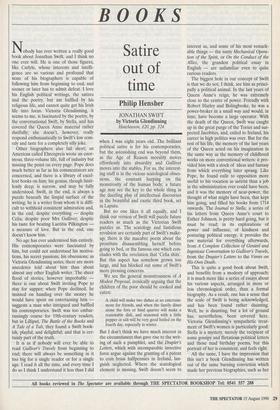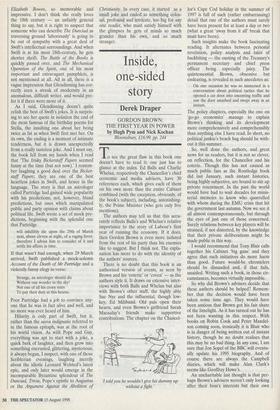BOOKS
Satire out of time
Philip Hensher
JONATHAN SWIFT by Victoria Glendinning Hutchinson, £20, pp. 324 Nobody has ever written a really good book about Jonathan Swift, and I think no one ever will. He is one of those figures, like Carlyle, whose interests and intelli- gence are so various and profound that none of his biographers is capable of following him from beginning to end, and sooner or later has to admit defeat. I love his English political writings, the satires and the poetry, but am baffled by his religious life, and cannot quite get his Irish life into focus. Victoria Glendinning, it seems to me, is fascinated by the poetry, by the conversational Swift, by Stella, and has covered the Queen Anne material rather dutifully; she doesn't, however, really respond enthusiastically to Swift's low com- edy and taste for a completely silly joke.
Other biographers also fall short; an American called Ehrenpreis wrote an enor- mous, three-volume life, full of industry but missing the point on every page. Pope does much better as far as his commentators are concerned, and there is a library of excel- lent books on him; his genius, though limit- lessly deep, is narrow, and may be fully understood. Swift, in the end, is always a puzzle beneath the limpid surface of the writing; he is a writer from whom it is diffi- cult to withhold consistent admiration and, in the end, despite everything — despite Celia, despite poor Mrs Gulliver, despite his taste for beating Laetitia Pilkington a measure of love. But in the end, one doesn't know him.
No age has ever understood him entirely. His contemporaries were fascinated by him, but could not understand his motiva- tions, his secret passions, his obsessions; as Victoria Glendinning notes, there are more anecdotes told about him than about almost any other English writer. The sheer flood of stories, however improbable there is one about Swift inviting Pope to stay for supper; when Pope declined, he insisted on handing over the money he would have spent on entertaining him suggests a man who intrigued and baffled his contemporaries. Swift was too embar- rassingly coarse for 19th-century readers, but in Lilliput, The Battle of the Books and A Tale of a Tub, they found a Swift book- ish, playful, and delightful; and that is cer- tainly part of the truth.
It is as if nobody will ever be able to read Gulliver's Travels from beginning to end; there will always be something in it too big for a single reader or for a single age. I read it all the time, and every time I do so I think I understand it less than I did when I was eight years old. The brilliant political satire is for his contemporaries, but the astonishing end was beyond them, as the Age of Reason morality moves effortlessly into absurdity and Gulliver moves into the stables. For us, the interest- ing stuff is in the vicious scatological obses- sions, the constant harping on the monstrosity of the human body; a future age may see the key to the whole thing in the dazzling play of intellectual discourses in the beautiful and exotic third book, set in Laputa.
But no one likes it all equally, and I think our version of Swift will puzzle future readers as much as the Victorian Swift puzzles us. The scatology and fastidious revulsion are certainly part of Swift's make- up; there is the macabre poem about the prostitute disassembling herself before going to bed, or the famous one which con- cludes with the revelation that 'Celia shits'. But this aspect has somehow grown too large, and has blocked out some of Swift's more pressing concerns.
We see the general monstrousness of A Modest Proposal, ironically arguing that the children of the poor should be cooked and eaten:
A child will make two dishes at an entertain- ment for friends, and when the family dines alone the fore or hind quarter will make a reasonable dish, and seasoned with a little pepper or salt will be very good boiled on the fourth day, especially in winter.
But I don't think we have much interest in the circumstances that gave rise to the writ- ing of such a pamphlet, and the Drapier's Letters, which with incomparable invective force argue against the granting of a patent to coin brass halfpennies in Ireland, lan- guish neglected. Where the scatological element is missing, Swift doesn't seem to interest us, and some of his most remark- able things — the nutty Mechanical Opera- tion of the Spirit, or On the Conduct of the Allies, the grandest political essay in English — are unfamiliar even to quite curious readers.
The biggest hole in our concept of Swift is that we do not, I think, see him as princi- pally a political animal. In the last years of Queen Anne's reign, he was extremely close to the centre of power. Friendly with Robert Harley and Bolingbroke, he was a power-broker in a small way and would, in time, have become a large operator. With the death of the Queen, Swift was caught up in the great purge of the Tories and sus- pected Jacobites, and, exiled to Ireland, his career in high politics was over. But for the rest of his life, the memory of the last years of the Queen acted on his imagination in the same way as the memory of childhood works on more conventional writers: it pro- vided him with a stock of ideas and fantasy from which everything later sprang. Like Pope, he found exile to opposition more useful to his vocation as satirist than a job in the administration ever could have been, and it was the memory of near-power, the thought of what might have been, that kept him going, and filled his books from 1714 onwards. The Journal to Stella, a series of his letters from Queen Anne's court to Esther Johnson, is pretty hard going, but it must be read; in its explorations of power and influence, of kindness and posturing political energy, it provides the raw material for everything afterwards, from A Complete Collection of Genteel and Ingenious Conversation to Gulliver's Travels, from the Drapier's Letters to the Verses on His Own Death.
This is quite a good book about Swift, and benefits from a modesty of approach; it is much more like a series of essays about his various aspects, arranged in more or less chronological order, than a formal biography. As a result, one has a sense that the scale of Swift is being acknowledged, and has been found rather daunting. Well, he is daunting, but a lot of ground has, nevertheless, been covered here. Victoria Glendinning's sympathetic treat- ment of Swift's women is particularly good: Stella is a mystery, merely the recipient of some gossipy and flirtatious political letters and those mad birthday poems, but this portrait of her is consistent, and feels right.
All the same, I have the impression that this isn't a book Glendinning has written out of the same burning conviction which made her previous biographies, such as her Elizabeth Bowen, so memorable and impressive. I don't think she really loves the 18th century — an unfairly general thing to say, but it is right to suspect that someone who can describe The Dunciad as traversing ground 'laboriously' is going to be out of sympathy with a great deal of Swift's intellectual surroundings. And when Swift is at his most 18th-century, he gets shorter shrift. The Battle of the Books is quickly passed over, and The Mechanical Operation of the Spirit, one of his most important and extravagant pamphlets, is not mentioned at all. All in all, there is a vague impression that Glendinning has cor- rectly seen a streak of modernity in an anomalous, difficult writer, and would pre- fer it if there were more of it.
As I said, Glendinning doesn't quite relish the best of Swift's jokes. It is surpris- ing to see her quote in isolation the end of the most famous of the birthday poems for Stella, the insulting one about her being twice as fat as when Swift first met her. On its own, the ending is a moment of intimate tenderness, but it is drawn unexpectedly from a really tasteless joke. And I must say, the book fell from my hands when I read that The frisky Bickerstaff Papers seemed funny at the time (but not now).' I remem- ber laughing a good deal over the Bicker- staff Papers; they are one of the best heartless jokes in Swift, and hence in the language. The story is that an astrologer called Partridge had gained wide popularity with his predictions; not, however, bland predictions, but ones which manipulated public and party opinion with claims about political life. Swift wrote a set of mock pre- dictions, beginning with the splendid one that Partridge
will infallibly die upon the 29th of March next, about eleven at night, of a raging fever; therefore I advise him to consider of it and settle his affairs in time.
If that wasn't bad enough, when 29 March arrived, Swift published a mock-solemn Account of the Death of Mr Partridge and a violently funny elegy in verse: Strange, an astrologer should die Without one wonder in the sky! Not one of all his crony stars To pay their duty at this hearse.
Poor Partridge had a job to convince any- one that he was in fact alive and well, and no more was ever heard of him.
Hilarity is only part of Swift, but it, rather than the saeva indignatio referred to in the famous epitaph, was at the root of his world vision. As with Pope and Gay, everything was apt to start with a joke, a quick bark of laughter, and then grow into something encrusted, glittering, mysterious; it always began, I suspect, with one of those Scriblerian evenings, laughing merrily about the idiotic Leonard Welsted's latest epic, and only later would emerge in the incomparable Byzantine splendour of The Dunciad, Trivia, Pope's epistle to Augustus or the Argument Against the Abolition of Christianity. In every case, it started as a small joke and ended as something colos- sal, profound and intricate, too big for any one reader, who must satisfy himself with the glimpses he gets of minds so much grander than his own, and so much stranger.



























































 Previous page
Previous page